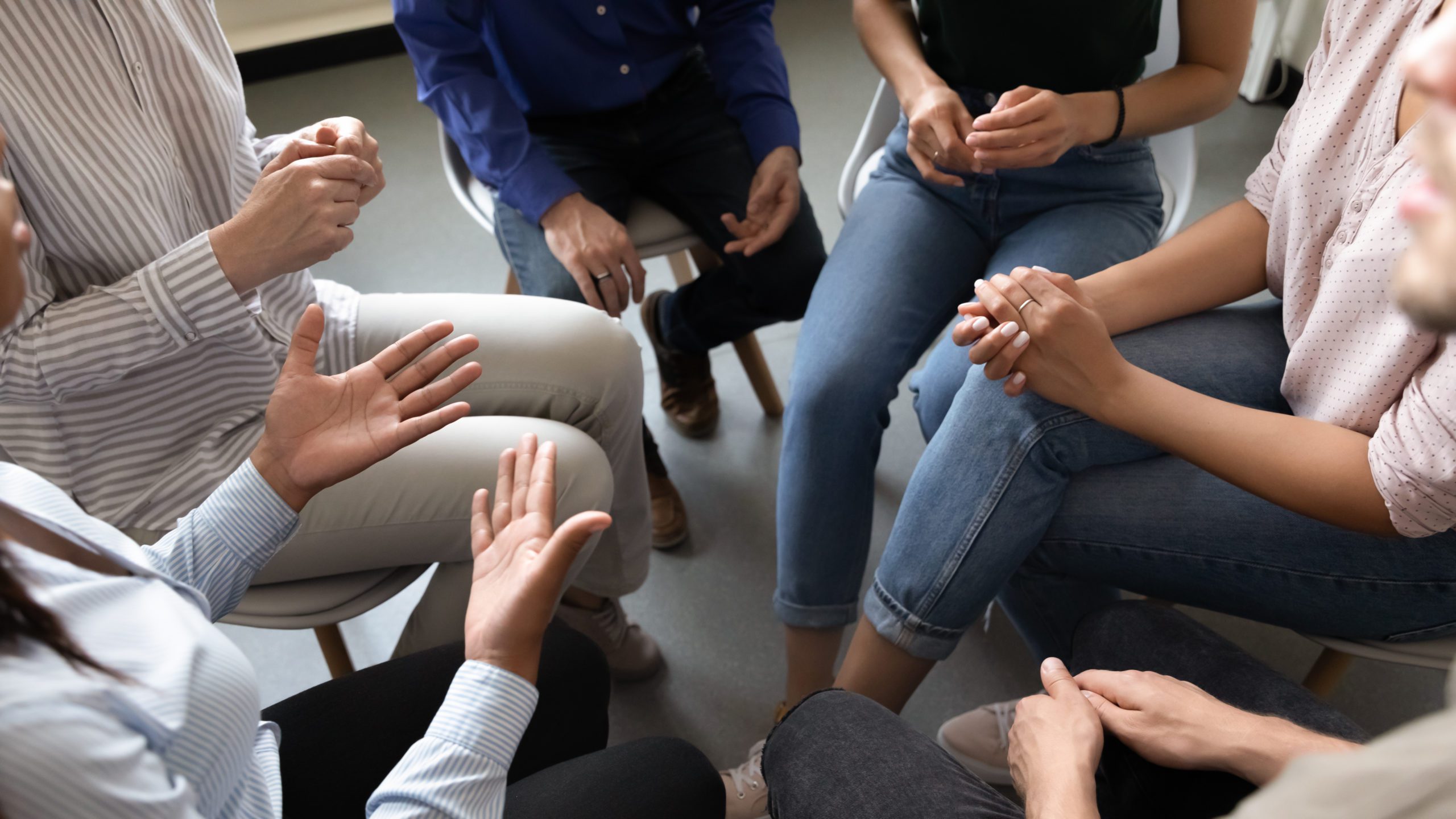What is Drug Intervention?
Questions About Treatment?
Our knowledgeable team is ready to discuss your situation and options. Your call is confidential with no obligation required.
A Carefully Planned Process
A drug addiction intervention is a carefully planned process where family members and close friends of someone struggling with addiction gather to encourage their loved one to seek help and warn them of the potential consequences of their addiction. A drug intervention can successfully encourage someone struggling to get the help needed to recover from addiction.1
During an intervention, team members should avoid negative statements and should ensure they confront their loved one in a non-threatening way to get the best results.

Who Should Be on the Intervention Team?
Depending on the individual, different people may be the right fit for the intervention team. Generally, the intervention team consists of close friends and family. A therapist or a professional drug intervention specialist may also be part of the intervention team to provide additional support. A drug intervention counselor can be a good addition to the intervention team and can help make the process go more smoothly.2
What Are the Main Goals of Drug Addiction Intervention?
The main goals of a drug addiction intervention are to make the person struggling aware of their problem and how it is affecting them and their loved ones, as well as to encourage them to get the help that is needed to recover from addiction. Intervention for addiction can also be a good way for family members and friends to lend support to a loved one and show them there are people in their life who care.
How to Do an Intervention for Drug Addiction
There are certain steps you should take to successfully intervene for drug addiction. Using the following steps will make the intervention process as successful as possible.
Make a Plan
Before staging an intervention for addiction, you must make a plan. An effective drug intervention plan will include:
- Who will be on the intervention team
- Day and time for the intervention
- Each team member should prepare and review what they want to say
- Specific treatment program to offer during the intervention
Gather Information
Before holding an addiction intervention, you should gather information to present to the person struggling. Information can include how the addiction is affecting their life and the people around them, the risks of continued substance abuse, and treatment options that are available.
If you are looking for additional information you can present to your loved one, addiction intervention services can provide you with many resources.
Form the Intervention Team
Before the addiction intervention, you should form the intervention team. Generally, you should choose people who are close to the person who is struggling and who will provide positive support during the intervention.
It’s also important to note that someone your loved one dislikes should not be present during the intervention. This helps ensure that the environment for the intervention is as welcoming as possible.
Decide on Specific Consequences
Consequences should be offered as part of the intervention if the person struggling decides not to seek help. While consequences should not be used to punish your loved one, they should be given to reinforce that there are consequences to continuing the addiction.
Examples of Potential Consequences
Examples of consequences that can be given include:
- Asking them to move out until they’re ready to begin addiction treatment
- Loss of visitation rights with children
- Taking away their car
Make Notes on What to Say
Before beginning the intervention, all team members should be prepared for what they want to say. This helps ensure the intervention process goes smoothly and has the strongest impact on the person struggling with the addiction.
Offer Help
You should offer help during the intervention, including support from everyone who is present. Often, the best way to offer help is to provide a specific addiction treatment program that the person struggling can use to begin the recovery process.
Set Boundaries
While it is good to be supportive of your loved one, you should set boundaries to ensure that the person struggling stays on the right track towards getting help for their addiction.
Hold the Intervention Meeting
Once you have all the plans in place, you can hold the intervention meeting and offer help to your loved one.
Follow Up
After the meeting has been completed, you should follow up to see if they have begun the recovery process. If your loved one has not yet started their recovery program, you should follow up with additional encouragement that they should get started as soon as possible.
Pro Tips to Ensure a Successful Drug Intervention
There are some addiction intervention strategies you can follow to ensure the highest possibility of success. During the intervention process, you should:
- Avoid defining the person by their addiction
- Continue providing support and encouragement after the intervention
- Don’t be judgmental
- Don’t choose team members who are overly emotional
- Don’t hold an intervention at home
- Don’t stage an intoxicated intervention
- Learn how to manage your personal feelings
- Plan it beforehand
Different Types of Addiction Intervention
There are different drug intervention programs that may be used. Depending on the individual struggling with addiction and their needs, different types of intervention may be more successful than others.
Crisis Intervention
A drug addiction crisis intervention is usually used after a crisis occurs, such as an overdose, drug-related health complication, or other negative consequences in someone’s life.
Typically, a mental health worker or other health professionals will help to encourage the person struggling to seek addiction treatment during the intervention process.
Brief Intervention
In some instances where the addiction is less severe, a brief intervention may be all that is needed to encourage someone to get help. A brief intervention involves giving people information or directing them where to go for further help.
ARISE
ARISE interventions are designed to help both the individual struggling and their family. ARISE intervention specialists help coach family members along the way to provide the best possible support.3
SMART
SMART is an acronym for specific, measurable, attainable, relevant, and timebound. SMART interventions use this goal model to help intervention team members put together an achievable plan for their loved one to seek help.
The Johnson Model
The Johnson Model of intervention is what most people picture when they think of an intervention. The Johnson Model involves seven steps:4
- Creating the intervention team
- Planning the intervention
- Focus on care
- Only focus on the issue of addiction
- Provide evidence to the person struggling
- Provide treatment options
Family Systemic Intervention
A family systemic intervention is different from a regular intervention in many ways. A family systemic intervention is unplanned, and the person struggling goes to the first meeting that is led by an addiction intervention specialist.
During this meeting, family members are allowed to openly discuss their loved one’s behavior and how it has impacted them. Unlike a regular intervention where there is one meeting, the family systemic model usually involves multiple meetings before the person struggling commits to a recovery program.5
Treatment Programs to Offer at an Intervention
During an addiction intervention, it is important to offer a treatment program that can be used to begin the recovery process.

Is a Professional Interventionist Helpful?
A professional interventionist can be very helpful and can often help the intervention process go more smoothly. There are many intervention services for addiction available that can provide you with a professional interventionist and resources that will lead to higher success rates.
Great Oaks Addiction Treatment Program
If you have a loved one that is struggling with addiction, the addiction treatment program at Great Oaks Recovery Center is an excellent option to offer during a drug addiction intervention.
Great Oaks offers evidence-based treatment services with high success rates in treating addiction. The knowledgeable staff at Great Oaks will help you every step of the way and can provide you with resources to make the intervention and treatment process go more smoothly.
Consult an Addiction Professional at Great Oaks Recovery Center
If you are planning an addiction intervention or considering the best ways to help a loved one who is struggling, you can consult with an addiction professional at Great Oaks Recovery Center. During your consultation meeting, you will be provided with resources and tips on how to best help your loved one get the help that is needed to recover.
Resources
- https://www.mayoclinic.org/diseases-conditions/mental-illness/in-depth/intervention/art-20047451
- https://www.verywellmind.com/would-an-intervention-help-my-addicted-loved-one-4147406
- https://vertavahealth.com/addiction-treatment/intervention/arise/
- https://www.associationofinterventionspecialists.org/what-is-the-johnson-model-of-intervention/
- https://www.associationofinterventionspecialists.org/what-is-the-family-systemic-model-of-intervention/
Questions About Treatment?
Our knowledgeable team is ready to discuss your situation and options. Your call is confidential with no obligation required.

